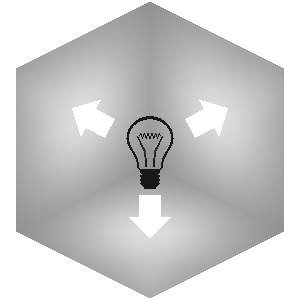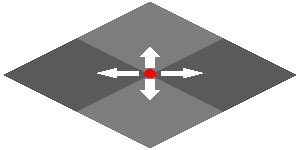Lighting
This section will go into how lighting data is rendered, not how it is calculated.
Face lighting
Every block has constant directional lighting which is statically assigned based on the angles of the faces. This is the base of all lighting therafter, no matter whether its smooth or not.
I haven’t found a generalized formula to this yet but I’m sure there is one
if (normal.y > 0.0f) {
lighting = 1.0f;
} else if (normal.y < 0.0f) {
lighting = 0.5f;
} else {
lighting = (abs(normal.x) * 0.6) + (abs(normal.z) * 0.8);
}
Source: Betrock
The resulting value is then multiplied with the underlying color.
Light levels
Lighting in Minecraft is based on a 4-Bit gradient from 0 - 15. As of Indev, this relationship is no longer linear.
If mapped from a range of 0.0 - 1.0, where 1.0 represents a light level of 15, we get the following mapping.
| 0 | 1 | 2 | 3 | 4 | 5 | 6 | 7 | 8 | 9 | 10 | 11 | 12 | 13 | 14 | 15 |
|---|---|---|---|---|---|---|---|---|---|---|---|---|---|---|---|
| 0.035 | 0.044 | 0.055 | 0.069 | 0.086 | 0.107 | 0.134 | 0.168 | 0.21 | 0.262 | 0.328 | 0.41 | 0.512 | 0.64 | 0.8 | 1.0f |
Or in code form
const float lightArray[16] = { 0.035f, 0.044f, 0.055f, 0.069f, 0.086f, 0.107f, 0.134f, 0.168f, 0.21f, 0.262f, 0.328f, 0.41f, 0.512f, 0.64f, 0.8f, 1.0f };
Non-smooth lighting
The illumination of a face is determined by the light level of the block its facing, i.e. the top of a grass block with a torch on it would get the full light level of 14.

Smooth Lighting
Every vertex samples and averages the light level of surrounding blocks along the direction of the face its part of. This provides ambient occlusion without any additional work, since solid blocks have a total light level of 0.
